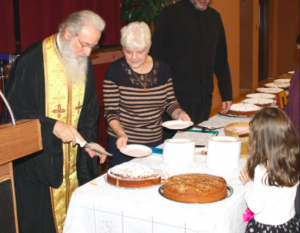Title: Vasilopita
General Information about Item:
- Genre: Customary Folklore: Superstition
- Language: English
- Country: Greece
Informant Data:
- Lia Constantine is a ’21 Dartmouth student from Fredericksburg, Virginia. Her Greek heritage is very much part of her identity. She relates to the family in the movie, “My Big Fat Greek Wedding” in a lot of ways. It is also something she has grown up with and that her parents and grandparents are very proud of, so she has inherited that pride. Both her parents are 100% Greek. They were both born in the U.S., but her dad lived in Greece for a period of time.
- Katie Spanos is a ’20 student at Dartmouth College. She is from Hummelstown, PA. Her dad is Greek, but her mom is not. Her dad’s family comes from a small village called Neohori, and she still has a lot of family there as well as some in other parts of Greece. Her and her siblings do not speak Greek, but her dad and aunts and uncles will speak Greek with her Yia-Yia. Their family follows most Greek customs and holidays, mainly because her entire family is Greek Orthodox.
Contextual Data:
- Social Context: The Vasilopita is celebrated on New Year’s Day either at a family member’s house among the entire extended family or at church on the Sunday before New Year’s Day among all of the parishioners of the church. It is done to celebrate the New Year and wish for good luck and prosperity.
- Cultural Context: This superstition honors Saint Basil and the idea of the Vasilopita comes from a story about him. The story goes that thieves stole riches from people, and Saint Basil caught him and had to return the riches to the people in a fair way. He decided to ask women to bake small cakes with the valuables inside and handed out pieces to the people, so that some pieces had valuables and others did not. This explains the idea of putting the coin into the cake.
Item:
- Each year, all of the members of a family or a church gather for New Year’s Day celebrations. Someone, often the woman of the house or the Philoptochos of the church, will take the responsibility of baking the Vasilopita cake and hiding a coin somewhere inside. If at the church, the priest will cut the Vasilopita to give to church members, and if at the home, the head of the household will cut it. The first piece is “given” to Saint Basil, the second to Jesus, and the third to the Virgin Mary. The pieces are then given to the head of the house and then in order of age from oldest to youngest. In the church setting, the pieces are given out to the Priest, the Parish Council President, the Choir Director, the chanters, and other important people before the rest of the church members. Once everyone has received their piece then you are allowed to eat. Whoever finds the coin in their piece announces it to the family or church and it is said they have good luck for the entire year.
Associated file (a video, audio, or image file):

Father Michael Varvarelis with the Sunday School leader at Holy Trinity Greek Orthodox Church in Camp Hill, Pennsylvania handing out pieces of the Vasilopita.
Interview with Lia Constantine
Transcript of Associated File:
- Lia Constantine: “So we make this bread called Vasilopita and you put a coin inside the bread and you cut a piece out for your house and the cat or the dog and you do one for God and one for your dad and mom and then the kids and then whoever when you cut that piece of bread the coin lands on, that person is going to have the luckiest year of their life. I’ve never gotten it… I haven’t really had the luckiest year of my life yet I guess.”
Informant’s Comments:
- None
Collector’s Comments:
- Two informants talked about this superstition, Katie Spanos and Lia Constantine. Both of them were interviewed in person.
Collector’s Name:
- Interviewed by Jessica Valvano
- Published by Katie Spanos
Tags/Keywords:
- Greek Superstitions, New Year’s Day, Vasilopita, Coin, Luck, Church, Family
